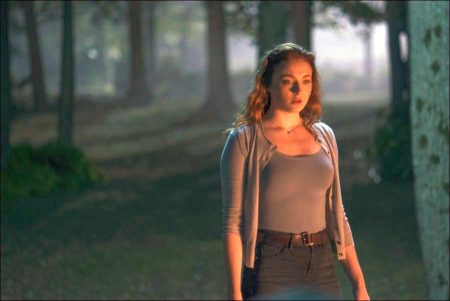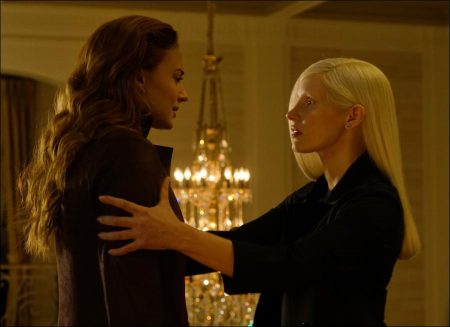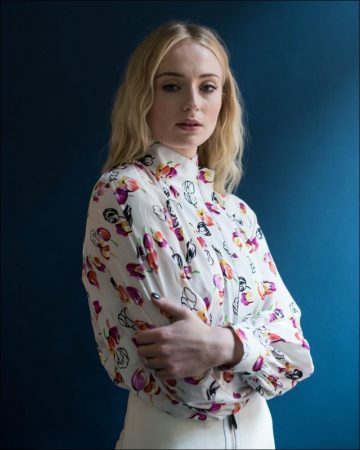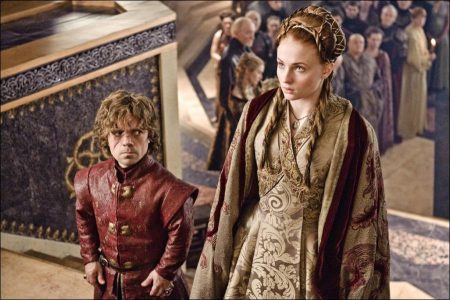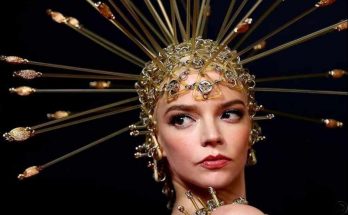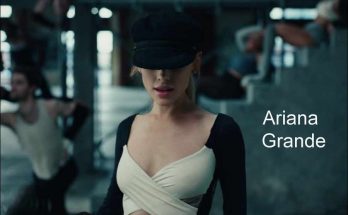We’re about to find out. With “Game of Thrones” behind her, Turner has a new movie, “Dark Phoenix,” that might make her the biggest thing to come out of Westeros.
After years of tragedy, upheaval and cataclysm, Winterfell is now secure and on the way to recovery in the capable hands of the new Queen in the North, Sansa Stark. But on a bright spring afternoon, the actress who plays her surveyed a new kingdom. From a high-rise hotel at the southern tip of Manhattan, Sophie Turner gazed out at the glittering harbor and beyond to Ellis Island and the Statue of Liberty, timeworn landmarks that nevertheless retain their power to dazzle, especially during the early blushes of your honeymoon with the city.
Turner relocated here from London last year, realizing a lifelong dream to live in New York — sure, that life only includes 23 years so far, but a dream’s a dream — when she moved in with the pop star Joe Jonas.
At that moment in March, Jonas was still just her fiancé. “Game of Thrones” hadn’t yet debuted its divisive final season, and “Dark Phoenix,” the new “X-Men” film she leads this summer as more established stars like James McAvoy and Jennifer Lawrence take a back seat, was far enough away to barely feel real.
“I still feel in the bubble a bit,” she said. But things move fast when you’re 23, and even faster when you’re stepping from one of the world’s biggest pop-culture franchises into another. In the coming weeks she would marry Jonas in Vegas, march in the Technicolor peacock parade at the Met Gala, do goat yoga for Vogue, cavort with a unicorn for Harper’s Bazaar and parse the infamous “Game of Thrones” coffee cup on “The Tonight Show,” all while driving Daenerys Targaryen toward incendiary madness as Sansa on the HBO series.
On June 7 comes “Dark Phoenix,” in which both she and her titular character, nee Jean Grey, leave comfortable cocoons to see if they might be capable of even more than they realize. For Turner that means moving on from “Thrones,” her home for most of the past decade, to find out if her own personal cache of superpowers includes the ability to carry a Marvel movie.
But the thing about growing up inside an enormously magical and violent phenomenon like “Game of Thrones” is, it leaves you more or less ready for anything, showbiz-wise. Goats and unicorns are nothing compared to dragons and zombie armies. Superhero-scale productions feel like home.
“Game of Thrones” was the defining pop-culture franchise of the decade. (Avengers, schmavengers.) But for a girl who grew up in a tiny English village (Chesterton, about 65 miles northwest of London) and then joined the show at 13, the cloistered production was also a haven from a world that was becoming more complicated with the fame and exposure that come from being on a hit TV show.
The cast was collectively an emotional wreck as the production neared its end — “It was just a huge cry fest; the makeup artists hated us” — and in the immediate aftermath, Turner felt a spike of existential terror. “I started to think, who am I without it?” she said. “What do I do? What do I like? I don’t have an identity.”
Which is understandable. But the truth is Turner is poised to become the biggest star to emerge from the show, a charismatic young celebrity whose fame and opportunities will likely only expand now that she’s not shooting “Thrones” seven months a year. At a time when pop culture is defined by universes, she’s part of two of the biggest — three if you count the Jonas Brothers. (The video for “Sucker” that she starred in with the band and her equally glamorous sister-in-law, Priyanka Chopra, has been watched more than 130 million times, nearly quadruple the total for an average episode of “Game of Thrones.”) But she’s still not entirely used to it.
“I hate being me in public,” she said. “I would rather be a character.” She’s known for trolling the paparazzi, and you can glimpse something of her personality in the photos of her making odd faces with Joe Jonas or aiming her own camera at the photographers — the wry playfulness, mixed with a self-protectiveness that won’t quite let her just ignore them and move on. In person she is funny and easygoing, and frank about her past struggles with depression and feelings of insecurity.
“When I’m on set, I feel great,” she said. “I feel very happy. But then after the fact — that’s when the anxiety kicks in.”
The notion is hard to square with the statuesque actress sitting in front of you, reclining comfortably and casually swigging from a bottle of green tea, a tattoo of a Stark wolf and a line from the show (“The Pack Survives”) visible on her arm.
But it’s this combination of easy confidence and vulnerability that made Sansa’s extreme trajectory over eight seasons, from callow neophyte to commanding leader, seem believable. It’s the same quality that made Kinberg want her for Jean Grey, an emotionally delicate hero with more power than she knows how to handle.
“She is this 5-foot-9-inch extraordinary-looking human who also feels as insecure and broken as the rest of us,” he said of Turner.
The period after “Thrones” ended was “a big healing time for me,” she said, and she spent it doing as little as possible. When we talked at the end of that stretch, she was as curious as anyone to see how the next few months would go, even as she allowed that it was nerve-racking to have the film coming so closely behind “Game of Thrones,” given the scrutiny each — and by extension, she — would receive.
As of Sunday the first half of the equation has been settled and … let’s say the reviews were mixed. Less for Turner, whose Sansa was a bright spot in the final episodes, than for the loudly loathed season itself. On most Monday mornings Twitter felt like a Bellagio fountain of #GameofThrones haterade, and more than 1 million people signed a symbolic petition to have the final season remade.
Turner relocated to New York from London last year when she moved in with the pop star Joe Jonas. “I take a lot of inspiration from him,” she said.CreditValerie Chiang for The New York Times
“People always have an idea in their heads of how they want a show to finish, and so when it doesn’t go to their liking they start to speak up about it and rebel,” she said in a phone conversation the morning after the finale. (She hadn’t yet seen the episode herself, “because I was alone when it came out, and I truly can’t be alone to watch it.”)
She added, “All of these petitions and things like that — I think it’s disrespectful to the crew, and the writers, and the filmmakers who have worked tirelessly over 10 years, and for 11 months shooting the last season.”
But unlike many associated with the show, Turner has dealt with fan scorn from the beginning. People hated Sansa in the early days — dimwittedly so, generally, given that she was by design besotted with the medieval fantasy tropes that the show aimed to shatter.
“A few people didn’t understand that she was a brilliant actress, merely because she was doing things they didn’t like,” the creators D.B. Weiss and David Benioff wrote in a joint email. But “we knew that as the character came into her own, and as Sophie came into her own, people would come to see them both for what they are.”
Which happened, eventually. Over the years Sansa was the avatar for the show’s best and worst impulses. The once immature girl with romantic dreams of wearing a crown ultimately got there by becoming savvy and strong, one of several nuanced, exceedingly capable women in a story whose men, by the end, were mostly dunces.
She was also run through the wringer, to the point that, after Sansa was raped on her wedding night in Season 5, Turner found herself at the center of a national outcry over the show’s use of sexual violence. Then this past season, the writers had the nerve to have Sansa seem to credit the abuse with making her strong.
Turner, left, at the 2017 Golden Globes with Maisie Williams, her onscreen sister on “Thrones” — the one person who knew what it was like to grow up inside the show.CreditFrazer Harrison/Getty Images
“I don’t think that was the intention,” she said. “It was that she was strong in spite of all of the horrific things that she’s gone through, not because of them.”
But no matter what she was going through onscreen, she said, it was often easier than the experience of growing up in public.
Turner is, by any conceivable definition, beautiful. But she was also, not so long ago, a 16-year-old girl being bombarded with her own image at a time when her image was often the last thing she wanted to see. She leaned hard on her onscreen sister, Maisie Williams (Arya Stark), the one other girl in the world who understood what it was like to grow up inside “Game of Thrones.”
“To go home at the end of the day, if I felt really fat that day or if I felt like my face looked weird or I had huge zits, to be able to go home to the hotel room and sit there and cry with Maisie — it was the best thing for us,” Turner said. “I’m glad I wasn’t crying on my own.”
To make things worse, the social media hordes picked her apart — punishing Turner for Sansa’s perceived sins as much as anything — and she was feeling very much like the inexperienced actor she was.
“As everyone could tell in Season 1, I was a terrible actress,” she said, with a matter-of-factness that’s a little heartbreaking if you think of a teenager who, much like Sansa, was strapped into a corset in an unfamiliar country, feeling like she was doing a lousy job.
On set she was known for a breezy professionalism that belied her youth. But she struggled with bouts of anxiety and depression, which she’s learned to manage through therapy. She also took comfort in Sansa — even as the poor girl was being put through an ever more baroque series of horrors, Turner often found it a more comfortable space to occupy than her own skin.
She says now that she admires Sansa, specifically the way she learned to work the angles and thrive in a tough situation. In a way, Turner did, too. Thrust into a slightly overwhelming situation, she watched and she learned.
She learned how to be an actor by observing Peter Dinklage and Lena Headey, she said, especially their naturalism and the way they could enter a room and immediately make it their own.
But whatever her self-criticisms, her talent was apparent from the start. Dinklage, who as Tyrion Lannister shared many early scenes with her as well as some of the best moments in the final season, said Turner “has a beautiful stillness to her as an actor that’s incredibly rare.”
“From the start as a very young girl she had such discipline,” he wrote in an email. “One minute she could be dancing and singing a musical number and the instant they are camera ready she can flip the switch and dig so deep emotionally. That’s a gift.”
Turner brought Kinberg to tears with her audition for 2016’s “X-Men: Apocalypse,” in which Jean Grey was more of a supporting character.
Turner says now that she admires Sansa Stark, specifically the way she learned to work the angles and thrive in a tough situation. In a way, Turner did, too.
But in “Dark Phoenix” she’s the center of the story. The film broadly retraces the contours of 2006’s “X-Men: The Last Stand,” the not-very-good conclusion of the first generation of X-Men films. Kinberg, who also wrote that one, acknowledges now that even though it was technically mostly the story of Jean Grey, then played by Famke Janssen, she spent most of her time “being saved by dudes.”
“Dark Phoenix” is different, and is largely about the phenomenally powerful Jean Grey rejecting the corner she’s been put into by Charles Xavier (McAvoy) in favor of embracing her own agency, with the help of a mentoring alien played by Jessica Chastain.
If you surmise that this plot would give “Dark Phoenix” a feminist subtext, you’d be wrong — it’s pretty much the entire text. (“We should be called the X-Women,” Lawrence’s character Mystique says at one point.) The real-world parallels are unmissable, within both the larger cultural narrative about women rejecting society’s constraints and Turner’s personal one.
Chastain was struck by Turner’s poise when she met her before shooting began. But she also sensed the uncertainty of an actor transitioning into a higher-profile phase of her career. “There was this idea of like, What am I allowed to do? What am I allowed to say? Who am I allowed to be?” Chastain said. “It’s really exciting for me to see Soph understand that everything that’s happening to her is because of her — she created this.”
For Turner, her trajectory is not unlike that of any young adult stepping out into the world. “It feels like ‘Game of Thrones’ was secondary school; now ‘X-Men’ is university,” she said.
Her “Thrones” pack scattered to the winds, Turner has created a new one with Jonas, whom she married earlier this month in a surprise ceremony in Las Vegas. (They had been engaged since 2017.) An Elvis impersonator presided; Diplo posted video to Instagram.
“I take a lot of inspiration from him,” she said of Jonas. “He went through a breakup with his band, who are also his brothers, and that’s got to be really, really difficult. For him to have a wonderful family life and wonderful relationships with his brothers, and still turn out to be a very grounded normal person, is astounding to me.”
The band is back on tour this summer, and together the couples form an extraordinarily attractive and talented group of young people doing young people things — hitting the slopes in Switzerland, pouring body shots upon gobsmacked Penn State students. But to Turner, there’s nothing extraordinary about it. “It just feels normal to us,” she said.
The paparazzi, she insists, are only there for Jonas. “I’m just like a tag-along,” she said, which is patently ridiculous. But the upshot is that even now, even in New York, she’s still bombarded with her image more than she’d like. “Social media just sucks,” she said.
Yes, it’s pretty terrible, I tell her. So how did you and Joe meet, anyway?
“Instagram,” she said, and then laughed hard and genuinely at the irony as well as, perhaps, what it suggested about the interwoven nature of young fame and multiplatform consumption.
“So it doesn’t suck that much.”
Views: 238
